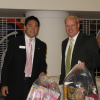SOURCE: Truist
DESCRIPTION:
Not every kid loves change, but Brent Yamaato did.
His father was an ambitious IBM executive in the 1970s and ’80s, when insiders joked that IBM stood for “I’ve been moved.” His family relocated about every two years, traveling across the country and back again, from Hawaii to New Jersey to California to Georgia. “I moved so often; you have to figure out how to reinvent yourself every time,” he says.
But instead of finding the change stressful, Yamaato found strength from it. Instead of the challenges being limitations, they were adventures.
Moving meant new communities, cultures, and opportunities to connect with other people. “I was an athlete,” he says, “so it was very easy for me to make friends because you can just go play a sport and join the team.” Adapting to new places developed Yamaato’s natural curiosity and ability to work with people.
Years later, he’s now in the perfect spot for someone who excels at transitions.
Yamaato, head of merger program office, is responsible for the fast-moving merger-of-equals integration, which created one of the top 10 U.S. commercial banks. It’s a complicated mission: Combine two financial companies with 54,000 teammates and thousands of different technologies and platforms, all while ensuring minimal disruption to the clients. The merger of equals, which began in 2019, is scheduled to be completed in 2022.
“Our office is the heartbeat of the merger,” Yamaato says. “We have folks focused on implementing the changes we need to come together as one company. We have technology professionals focusing on our platform. We have business professionals focused on the business changes. And we have people who ensure we have data integrity and quality. Together we are also all focused on the client and teammate experience.”
Yamaato reports to Jim Eckerle, head of enterprise integration, who Yamaato describes as, “the conductor of the largest orchestra that we play.” Yamaato says he and Eckerle are “the leaders of the sections of the orchestra, making sure they’re finely tuned and playing in sync with the other section leaders.”
To succeed, help everyone else win
Yamaato is known for his ability to quickly turn operational challenges into positive outcomes. For this, he’s earned a reputation as a kind of fixer.
He likes to say his job is to work himself out of a job. If his job goes away, that means he’s helped solve a problem and can go on to the next one.
“If you look at my career and all the roles I’ve had,” he says, “I haven’t been in a single role for probably more than 18 months before becoming engaged in the next challenge at the bank. In fact, this will be my longest tenure in a role in the past 20 years here.” (He’s been in his current position since 2019.)
Yamaato makes it clear that finding success in his role is not about him. He says his purpose is to make life better for all of Truist.
“I don’t focus solely on my success, ever,” he says. “My job every day is to figure out how to make the lives of those around me easier. Keep a focus on those around you and always ask, ‘How do I remove the roadblocks so they can be successful?’”
This thoughtful, caring approach to leadership contributes to Yamaato’s warm, open presence as a family man who’s easy to collaborate with. He’s straightforward and doesn’t shy away from being direct. His team gave him a poster two years ago with three words on it: authentic, transparent, accountable. He leads by example, and these are the purposeful words by which he wants to be known.
“We need to put our reputation and brand on the line every day,” he says.
“I’ve grown up in operations,” he says, “where it’s always about efficiency and cost. But you can never save your way to prosperity. That’s a fallacy. At the end of the day, you have to help the company protect and grow its revenue—even from the back office.”
Push for new experiences
Yamaato always knew he’d work in business. He went to the University of Georgia for his undergraduate degree, majoring in international business with a concentration in finance. He later earned his MBA at Georgia State. During college, he had a side hustle as a photographer and eventually managed a Glamour Shots photo studio. He enjoyed the people aspect of retail—talking to customers and managing and hiring people. But after the shop was robbed a couple of times, he realized that not everything about retail appealed to him.
That bit of management experience gave him an opportunity for a pivotal job out of college: working for the Federal Reserve Bank of Atlanta.
The Fed required management experience, which Yamaato had, so he was accepted to their management associate program. “It doesn’t matter where you start,” he says. “It really only matters where you end up.” The thread connecting the two is your purpose.
The Fed program gave him a foundation in banking operations that laid the groundwork for everything to come. At 28 years old, he ran the cash services department at the Federal Reserve Bank of Atlanta, with $3 billion in the vault.
“But I always knew I could do more,” he says. “I knew I could do even greater things.”
The Fed gave him precious lessons in loyalty and how to treat people.
When tragedy strikes—a lesson in leadership
While he was working at the Fed, Yamaato’s mother was diagnosed with breast cancer. While growing his career, Yamaato lived with his parents to help care for his mother during her three-year battle.
“What I remember is the empathy that my leadership at the Fed showed me,” he says. While running a two-shift operation, Yamaato worked at home during the day as needed and then on-site for his second shift at night. This hybrid approach meant his father could continue working at his job during the day and his mother was never alone.
“This was back before Wi-Fi,” he says. “I literally had a 500-foot phone cord connected to my laptop that allowed me to work and walk around the house to help my mom out.”
The entire C-suite attended his mother’s funeral to pay their respects. They showed up because it was the right thing to do. He still gets emotional talking about it.
“The empathy those leaders showed me was something I strive to emulate every day,” he says.
Not everyone is like you
Want success? Start with understanding, says Yamaato.
Early in his time at the Fed, he was ambitious and eager to get ahead. He was goal-driven and pushed himself in everything he did.
Coming out of school, he had high expectations. He was a frontline supervisor in his 20s but was frequently frustrated. He didn’t understand why everyone he worked with wasn’t working with the same kind of intensity and ambitiousness.
His father taught him an important lesson at that time: “You can’t expect everyone to be like you.”
That lesson has fostered empathy for people in all situations.
It’s a lesson he brings to work at the merger office every day. “My favorite part of my job is getting to know people, understanding what makes them tick, and then finding the need in the company that matches their passion.” He helps connect people’s individual purposes with the company’s. “When passion and purpose align with a need, it’s amazing to see the results,” he says.
He also brings that lesson home. The family travels often to expose his two children to different cultures, including his Japanese heritage and his wife’s Filipino culture. It’s a big world out there, and he wants his children to be well-rounded, smart, and sensitive so they can build a better future, just like their father strives to do every day.
KEYWORDS: NYSE: TFC, Truist, OnPurpose







